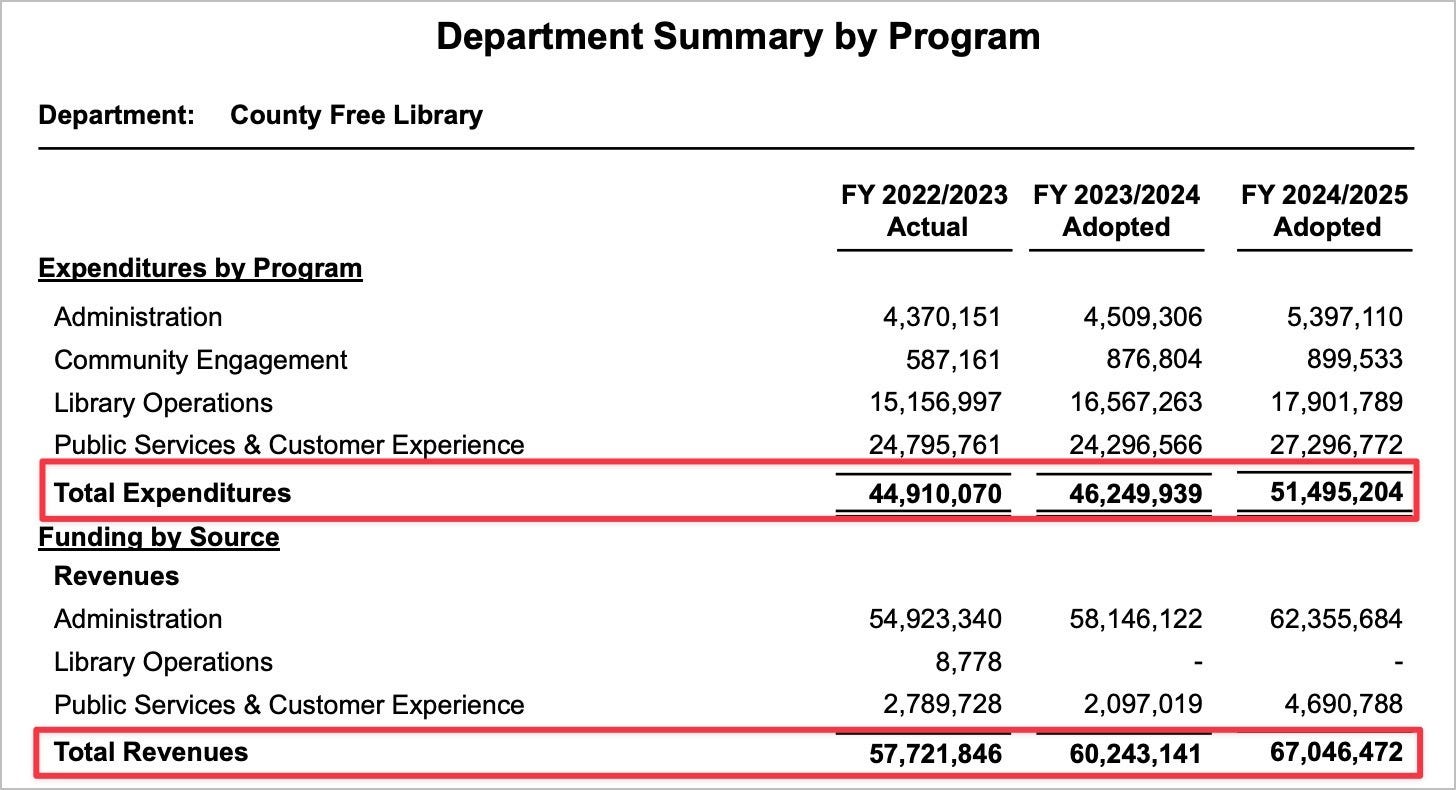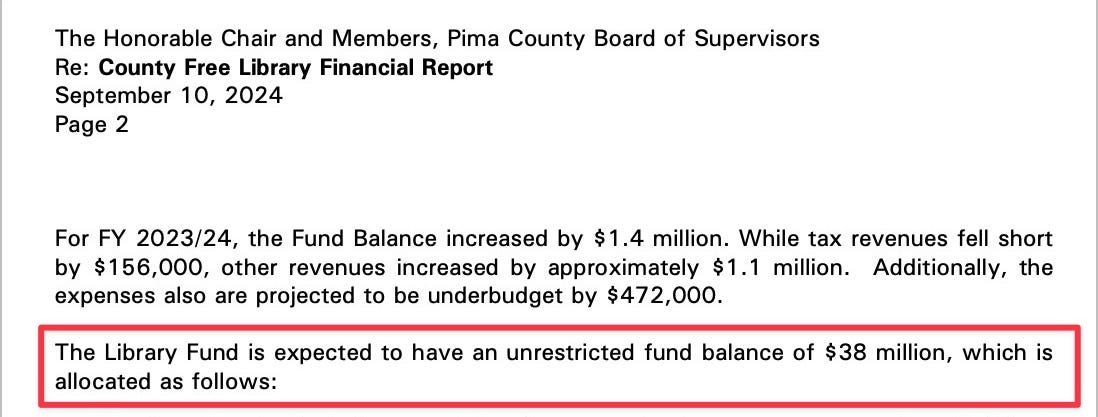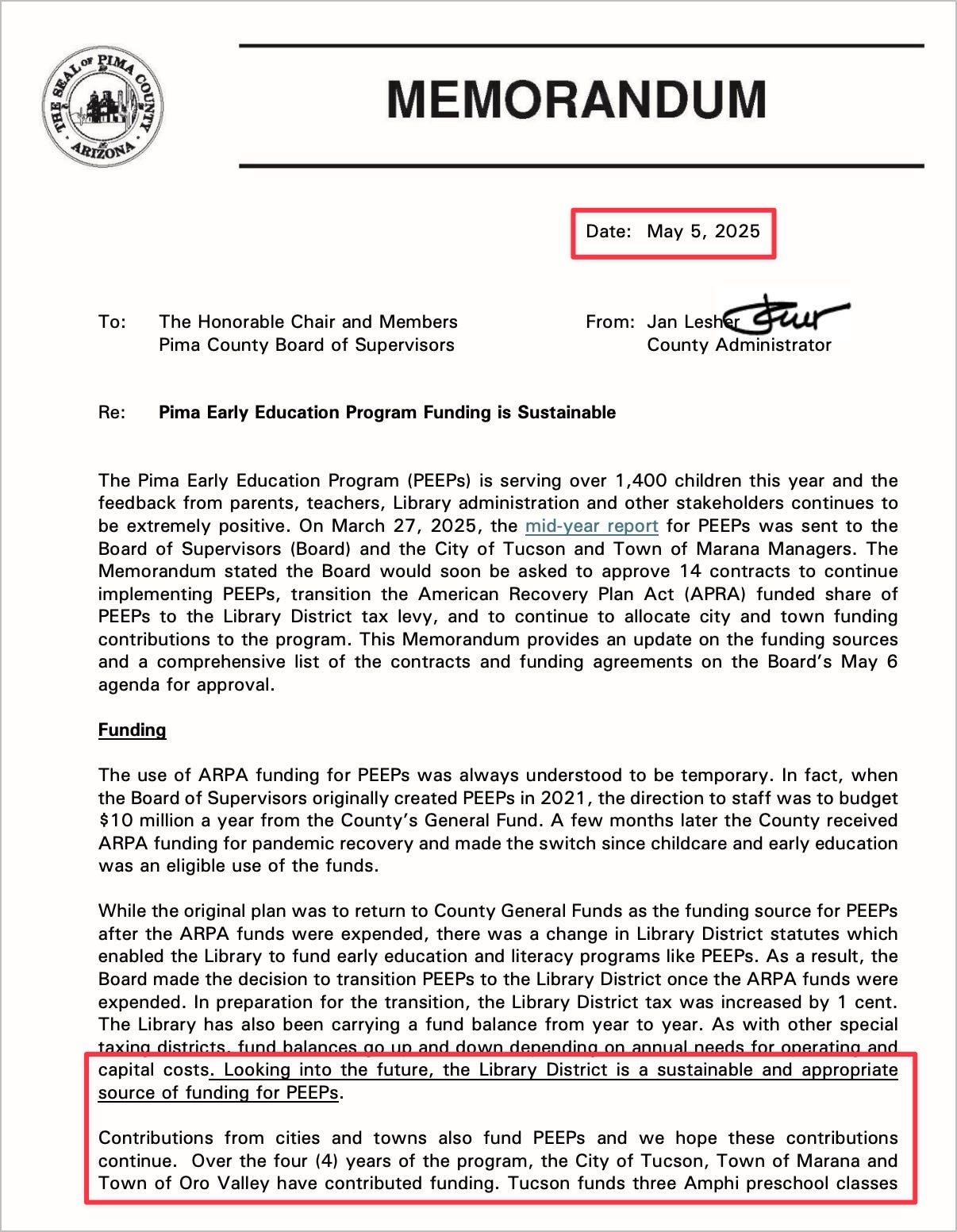📚 Election Year Reckoning: How Will Pima Pay for PEEPS When Library Reserves Run Dry in 2028?
How county officials redirected library savings to fund preschools while library branches face "strategic recalibration"
This article was written using publicly available documents from the county government.
📚 Election Year Reckoning: How Will Pima Pay for PEEPS When Library Reserves Run Dry in 2028?
The Paper Trail Exposes County's Shell Game With Your Tax Dollars
In a breathtaking display of budgetary sleight-of-hand that would make even Wall Street accountants blush, Pima County officials have orchestrated what can only be described, according to county watchdogs, as a taxpayer-funded shell game – quietly redirecting millions in library taxes to fund a preschool program while obscuring the long-term consequences for our community's libraries.
The evidence is damning, and it's all hiding in plain sight within the county's own documents.
Follow the Money: A Three Sonorans Investigation
For months, county officials have been spinning a narrative that both libraries and preschool education could thrive under their funding scheme. The reality, revealed through our meticulous review of budget documents, meeting agendas, and public statements, tells a very different story.
Let's follow the paper trail.
The Library Budget Surplus That Suddenly Vanished

First, examine the County Free Library budget for the past three fiscal years:
FY 2022/23:
Revenues: $57,721,846
Expenditures: $44,910,070
Surplus: $12,811,776
FY 2023/24:
Revenues: $60,243,141
Expenditures: $46,249,939
Surplus: $13,993,202
FY 2024/25:
Revenues: $67,046,472
Expenditures: $51,495,204
Surplus: $15,551,268
For three consecutive years, the library system generated surpluses exceeding $10 million annually, accumulating an estimated $38 million in reserves – a testament to prudent fiscal management.
Yet last August, county officials floated proposals to close multiple library branches (Frank De La Cruz-El Pueblo, Dewhirst-Catalina, and Santa Rosa) and shutter the Joel Valdez Main Library for "maintenance." The justification? Supposed budget constraints.
The audacity is breathtaking. Close libraries while sitting on a $38 million reserve? This isn't fiscal responsibility – it's manufacturing a crisis to justify resource redistribution.
September 2024: The Smoking Gun Memo

In a September 10, 2024, memo that county officials desperately hope you'll never read, County Administrator Jan Lesher wrote with striking clarity:
"The Library District does not have sufficient revenue streams to sustain a $10 million PEEPs program on an annual basis without significant restructuring. The options listed above provide ways to sustain the PEEPS program for a limited period, neither offers a permanent solution to ensure long term funding."
The key phrase? "Without significant restructuring." Translation: Libraries will eventually face cuts to maintain PEEPS funding. The memo explicitly acknowledges that the funding approach is unsustainable.
The May 2025 Damage Control Operation
Fast forward to May 5, 2025 – just one day before the Board of Supervisors was set to approve $30 million in PEEPS contracts over three years. Facing growing scrutiny from journalists at the Tucson Agenda…
For example, one of their recent beefs was over our coverage of the PEEPs program.
County officials want to pretend that the PEEPs program and the libraries aren’t in conflict for funding. All signs point to that being flatly wrong.
They may come to a solution that saves both. But they haven’t yet.
And they don’t like us pointing that out.
… County Administrator Jan Lesher issued a hastily prepared memo with the painfully defensive title: "Pima Early Education Program Funding is Sustainable."
In this remarkable document, Lesher contradicts her own September memo, now boldly claiming: "Looking into the future, the Library District is a sustainable and appropriate source of funding for PEEPs."
The memo ends with this underlined declaration: "PEEPs is sustainable and successful in its current form."
No financial projections. No explanation of how running $14 million in the red constitutes "sustainability." Just a desperate assertion that black is white, up is down, and deficit spending is sustainability.
$7,143 Per Child: Who Approved This?
At approximately $7,143 per child for 1,400 children, PEEPS costs roughly $10 million annually. With federal American Rescue Plan Act (ARPA) funds now exhausted, the county is turning to library reserves to fund the entire program.
The budget numbers are unforgiving. The Library District's FY 2025/26 budget is set at $82.7 million, while projected revenues from the library tax will bring in just $68.4 million – creating a $14.3 million shortfall to be covered by dipping into reserves.
This isn't sustainable fiscal management. It's burning through savings with no plan for what happens when the money runs out. That is, no publicly available plan besides applying an underline font to assertions that contradict previous memos.
The Fatal Contradiction
Perhaps the most revealing aspect of this funding shell game is the county's inability to maintain a consistent narrative. Compare these two official statements:
September 10, 2024 (Jan Lesher memo):
"The Library District does not have sufficient revenue streams to sustain a $10 million PEEPs program on an annual basis without significant restructuring."
May 5, 2025 (Jan Lesher memo):
"PEEPs is sustainable and successful in its current form."
Both statements cannot be true simultaneously. Either the Library District lacks sufficient revenue streams for PEEPS (as stated in September), or the funding arrangement is sustainable (as claimed in May).
What changed between September and May? Not the math – just the political pressure.
The City of Tucson Sees the Writing on the Wall
While county officials double down on their unsustainable funding scheme, the City of Tucson has made the difficult but fiscally responsible decision to withdraw its $750,000 annual contribution to PEEPS.
According to Tucson City Manager Tim Thomure's recommended budget, the city simply cannot afford to continue funding PEEPS amid broader budget constraints – a stark contrast to the county's willingness to drain library reserves.
This decision puts approximately 90 preschool slots at risk across five classrooms in the Amphitheater and Sunnyside school districts.
The SALC Connection: Corporate Influence Behind the Scenes
The Southern Arizona Leadership Council (SALC), a business group led by retired Major General Ted Maxwell, played a crucial behind-the-scenes role in facilitating this funding diversion.
During a Buckmaster Show interview, Maxwell revealed how SALC helped engineer a "creative interpretation" of library services to include preschool education:
"When you look at the library taxing districts... when you talk about early childhood literacy and getting those programs that will teach early childhood literacy, the majority of the county said, we can do that already. At the time the ruling from the Pima County attorney to the board was that the language wasn't clear. So can you use this library district to focus on early childhood literacy or not? And we're going, that's the basis of a library."
Maxwell further reflected the business community's mindset when he stated: "Our point is this PEEPS program doesn't have to be funded completely by the public sector."
The implication is clear: private interests helped reinterpret public tax usage to avoid proper funding for essential services.
The Board of Supervisors' Rubber Stamp
On May 6, 2025, with minimal public discussion and no meaningful fiscal analysis, the Pima County Board of Supervisors approved 14 separate contracts committing approximately $30 million in library tax funds to PEEPS over the next three years.
The board members, all of whom earn nearly $100,000 annually to attend just two meetings per month, failed to address the glaring contradiction between the September memo acknowledging unsustainability and the May memo's baseless claim that the arrangement is sustainable.
Not one supervisor demanded to see year-by-year projections showing what happens to library reserves over the three-year period. Not one asked the critical question: What happens in year four when the reserves are depleted?
The Math Doesn't Lie: A Fiscal Cliff Approaches
Let's do what county officials refuse to do – the basic math:
Current library reserves: Approximately $38 million
Annual PEEPS cost: $10 million
Annual library budget deficit for next year: $14.3 million
Estimated three-year total deficit: $42.9 million
Simple arithmetic reveals that the library's reserves will be completely exhausted before the end of the three-year contract period, leaving both PEEPS and libraries facing a fiscal cliff.
The county's own September 2024 memo acknowledged that after using the currently available funds, "additional funding streams would need to be identified for future years."
Yet the county now claims the arrangement is sustainable without identifying a single new funding source.
What the County Isn't Telling You About the "Future of Libraries"
Last August, when floating the idea of closing several libraries, the county cited a strategic planning document titled "Library of the Future," which discussed "Strategically Recalibrating Small Branches" and "Reimagining Staffing."
These euphemisms for branch closures and staff reductions weren't implemented at the time due to public outcry. However, with reserves being rapidly depleted to fund PEEPS, these proposals will inevitably resurface once the money runs out.
This creates a manufactured crisis: after depleting library reserves for preschool funding, will county officials claim they have "no choice" but to close branches and cut services?
The Human Cost: Communities Pay the Price
Behind these budget numbers are real people and communities who rely on both libraries and preschool education.
For the 1,400 children enrolled in PEEPS, the program provides critical early education that shapes their future opportunities. Many come from low-income families (75% belonging to racial or ethnic minorities and 21% being dual-language learners) who cannot afford private preschool tuition.
Simultaneously, libraries serve as essential lifelines for immigrants seeking citizenship resources, students needing internet access for homework, job seekers using computers for applications, and seniors finding community and information.
The cruel irony is that many families benefit from both services, yet county officials have created a funding structure that ultimately pits these essential services against each other.
Circumventing Voter Intent
Perhaps most troubling is how this funding arrangement circumvents voter oversight. When taxpayers approved the library district tax, they explicitly supported funding libraries – not preschools, regardless of how worthy.
If officials believe PEEPS deserves dedicated public funding (as it likely does), they should make that case directly to voters rather than diverting funds from another essential service without explicit voter approval.
This approach undermines democratic governance and accountability, setting a dangerous precedent for how tax dollars can be redirected without meaningful public input.
The Questions No One at the County Will Answer
Throughout this investigation, county officials have refused to address several critical questions:
If PEEPS funding is truly "sustainable" through the library tax, why does the county's own budget show the library running a $14.3 million deficit in FY 2025/26?
What happens when library reserves are depleted in year three or four? Which libraries will close? Which services will be cut?
Why did the county propose closing libraries last August while sitting on $38 million in reserves?
If both libraries and PEEPS are priorities, why not create dedicated, transparent funding for each?
Why was the public never directly consulted about this significant redirection of library tax funds?
As Three Sonorans previously reported, the answers likely lie in corporate influence, political expedience, and a willingness to sacrifice long-term sustainability for short-term solutions.
The Path Forward: Demanding Accountability
This investigation reveals an urgent need for greater transparency and accountability in how tax dollars are allocated in communities across Pima County.
Both libraries and early childhood education deserve proper funding – not a financial shell game that ultimately undermines both. Here's what concerned citizens can do:
Demand transparency: Contact your supervisor and demand to see year-by-year projections of library funding, including what happens when reserves are depleted.
Attend Board of Supervisors meetings: Public pressure stopped library closures last year and can force accountability now.
Support journalism that digs deeper: Independent outlets like Three Sonorans and the Tucson Agenda are uncovering what corporate media often misses.
Advocate for dedicated funding: Push officials to create proper, sustainable funding streams for both libraries and preschool education.
A Note of Hope: The Power of Community Action
Despite this investigation's troubling findings, there remains cause for optimism. When Pima County residents organized to oppose library closures last August, officials backed down. Public pressure works.
By demanding honest accounting, transparent governance, and genuine commitment to both libraries and early childhood education, we can ensure that these essential services receive the dedicated funding they deserve without being forced to compete for limited resources.
The county's approach pits worthy programs against each other while obscuring the real issues: insufficient revenue due to corporate tax breaks, misplaced priorities, and a lack of political courage to advocate for proper funding.
By rejecting this false choice and demanding better, we can create a Pima County that truly values both literacy and early education as essential investments in our community's future.
Support Independent Journalism at Three Sonorans
This type of investigative journalism requires resources, persistence, and freedom from corporate influence. As mainstream outlets increasingly abandon in-depth local reporting, Three Sonorans remains committed to following the money and holding power accountable.
Your support makes it possible for us to continue uncovering these important stories. Please consider subscribing to our Substack to ensure this vital reporting continues.
Join the Conversation
Do you think the county is being transparent about how library taxes are being used? Do you believe both libraries and PEEPS deserve dedicated, sustainable funding rather than being forced to compete? What solutions would you propose to ensure both essential services are properly supported?
Share your thoughts in the comments below.
¡Hasta la victoria siempre!
The Cast of Characters
Jan Lesher - Pima County Administrator who authored contradictory memos about PEEPS funding sustainability, first stating in September 2024 that "The Library District does not have sufficient revenue streams to sustain a $10 million PEEPs program" then claiming in May 2025 that "PEEPs is sustainable and successful in its current form."
Ted Maxwell - President and CEO of Southern Arizona Leadership Council (SALC), retired two-star major general who helped engineer the legal interpretation allowing library funds to be used for preschools, stating "Our point is this PEEPS program doesn't have to be funded completely by the public sector."
Tim Thomure - Tucson City Manager who recommended eliminating the city's $750,000 contribution to PEEPS in the FY 2025/26 budget due to financial constraints.
Nicole Fyffe - Senior advisor in the Pima County Administrator's Office who told the Tucson Agenda that "there is sufficient funding to fund operations, capital and PEEPs" despite budget documents showing large deficits.
Amber Mathewson - County Library Director who, according to county officials, "is not concerned and has been very supportive of the transition to library funding" despite the potential impact on library services. Mathewson is retiring next month before next year’s budget is approved.
The Pima County Board of Supervisors - Collectively approved 14 separate contracts committing approximately $30 million in library tax funds to PEEPS over three years without addressing the long-term sustainability questions.
Have a scoop or a story you want us to follow up on? Send us a message!








